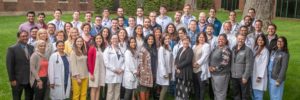December 12th, 2019
Why Did I Spend an Extra Year as a Chief Resident?
Prarthna Bhardwaj, MD

Dr. Bhardwaj is an Internal Medicine Chief Resident at UMMS – Baystate Medical Center in Springfield, MA
I was in conversation with a residency applicant recently when we broached the topic of my career plans. I explained that I was interested in pursuing a hematology/oncology fellowship in the future. He asked “Why did you do a chief year, then? Were you trying to improve your application?” At first, I was somewhat offended, but I quickly recollected the number of times I have been asked why I chose to do a chief year. For folks who are genuinely interested in pursuing a chief year, here is why I chose to do it:
To hone my teaching skills
If you are interested in an academic career and want to teach students, residents, and fellows, you must know how to do so. So, this one is obvious.
I started teaching medical students early in my residency. This experience made me quickly realize that I had to read a lot to lead these sessions, because these med students often asked ridiculously hard questions about seemingly obvious things, and I did not have an answer. Sometimes, just knowing a lot about a topic was not enough — I had to know how to deliver that content to keep my learners engaged. I am still looking for a better way to learn medicine!
Chief residents typically lead, facilitate, or present didactic sessions daily to large groups of learners at different levels. This includes morning reports, noon conferences, academic half days, and simulation sessions. Most residency programs have medical education–related sessions, workshops, and information for chief residents that equip us with tools to be better medical educators.
A welcome change of pace
After working rigorously for the last 3 years during residency, I thought that a chief year would help me “take it easy” before I transitioned into an emotionally draining fellowship. What that really meant was having weekends off and a more consistent schedule which would allow me to pursue things I love, but missed doing during residency (like reading a book or binge watching a series on Netflix). However, a word of caution: Chief residents must be prepared to be on call 24/7!
I knew I wanted to pursue a fellowship even before I started residency. However, for a lot of people who choose to do a chief year, the extra year allows them to figure out truly what they want to do. They can transition into subspecialty training, academic hospitalist jobs, and primary care positions in different healthcare settings.
A great way to give back!
I was a wallflower during medical school. Coming to my program for residency helped me come out of my shell (or so I think). Moving from a different country, 8000 miles away, I was wholeheartedly embraced into the program. The incredible opportunities that I got at every point filled me with increasing confidence in myself and my abilities. That is what working in a supportive environment can do for an individual. In addition, I was also encouraged during residency to actively involve myself in other medical organizations, like the Massachusetts Medical Society and the American College of Physicians, which opened a lot of wonderful networking avenues for me. I am grateful for the support I have received personally and professionally. This made me want to contribute in my own way to the legacy of the program. I anticipated that this role would involve passionately advocating for residents, and bringing meaningful change and innovation to the program where necessary.
My family
Given the unpredictability of a fellowship match, especially with visa restrictions, doing a chief year was the most definite way for me to stay under the same roof with my husband. He started his fellowship at the same hospital during the 3rd year of my residency and had 2 more years after that to finish. Let’s face it – what we do in medicine is incredibly hard at times and having the support of family is truly a blessing!
Personal and professional growth
Saving the best one for the last! I applied a chief resident year, because as I viewed it as a great year for personal growth for me. Being more empowered by learning how to navigate difficult conversations, how to manage different kinds of people, how to negotiate, and how to break bad news was important to me. This is exactly what I would do in the future as a hematology/oncology doctor and, hence, I needed these skills! I have been at this job for 6 months, and my growth curve looks like this:  In the past 6 months, I found myself in situations where I dealt with conflict head on because no one else could do it. For example, it was incredibly hard to tell a resident that they would not get vacation time during their time on the floors. It is well known that these are not typical vacation weeks, but have you ever been the person saying “No” to someone?
In the past 6 months, I found myself in situations where I dealt with conflict head on because no one else could do it. For example, it was incredibly hard to tell a resident that they would not get vacation time during their time on the floors. It is well known that these are not typical vacation weeks, but have you ever been the person saying “No” to someone?
The most important aspect of my growth is in the way I give and receive feedback. As a resident, constructive criticism always made me feel uncomfortable, even though I tried to have an open mind. This year, I truly learned that ‘feedback is feedback – not good or bad.’ Feedback is always helpful if it is specific and timely.
This year is turning out to be a phenomenal year for rediscovering myself and identifying my leadership style. A chief year comes with highs and lows. It is important for anyone who is considering a chief year to evaluate why he or she wants to do it in the first place. It is a hard job as it involves A LOT of people skills, so if you are interested in applying, talk to your chief residents to get a glimpse of what the job looks like. Maybe you can even shadow them for a day!
As for me, the next time someone asks me if I did a chief year to improve my applications, I shall just chuckle to myself.
Feel free to ping me @prarthnavb on twitter for comments and thoughts.




Dear Dr. Bhardwaj:
Nicely put.
Some things might have changed and some might not with time, since I served my Chief Residency in Internal Medicine at University of Toronto Women’s College Hospital in 1977; before I went onto my Rheumatology Fellowship.
I was not eyeing on any academic position, but my subsequent practice career never dilute my learning and teaching enthusiasm.
CR position helped you to consolidate your leadership as well as knowledge, it also cultivated your administrative and educational skill.
Well done.
Eugene Fung, MD, FRCPC,FACR
Thank you so much for sharing your thoughts, Dr. Fung. I cannot agree more! It has really helped me consolidate what I have learnt in 3 years or residency through several teaching opportunities.
Well written by you. Hope to see more articles in future which helps residents and aspirants preparing for USMLE exams.
Thank you for your feedback. I will be sure to target some blogposts in the future towards USMLE aspirants especially among international medical graduates.
Great reflection! Very interesting to get more insight about the Chief year. Thanks for sharing.☺️
Thank you for reading and sharing your thoughts 🙂